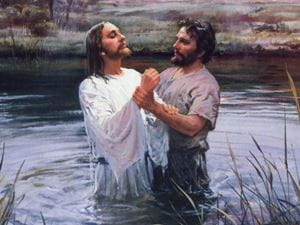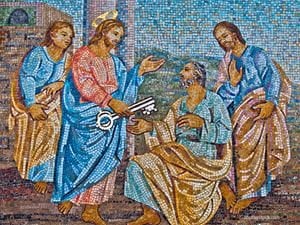Simon Peter, commonly referred to as Peter, Simon and Cephas, was one of the original 12 apostles, the first followers of Jesus Christ. After Jesus’ ascension, Peter became the leader of the apostles. Along with James and John, Peter was chosen by Jesus to be present during certain important moments of His ministry, which speaks to his value, not only in Jesus’ life but also in the Gospel. Peter is recognized for many things. He was not only an outspoken and passionate disciple; he was also one of Jesus’ closest friends and a pillar of the church. Scripture tells us, “and when James and Cephas and John, who seemed to be pillars, perceived the grace that was given to me, they gave the right hand of fellowship to Barnabas and me…” (Galatians 2:9). Peter was strong-willed, enthusiastic, but also impulsive and brash at times. While Peter had his strengths, he also had his shortcomings. Despite this, the Lord chose him and molded him into exactly who intended him to be. Whether it was stepping out of a boat onto a tossing sea or stepping across the threshold of a Gentile home for the first time, Peter found courage in Jesus Christ. Here are five things you may not know about Peter in the Bible.
He Was a Follower of John the Baptist

Peter, who at the time was called Simon, was a follower of John the Baptist and was the very first disciple that Jesus called, along with his brother Andrew (John 1:35-29). Simon was originally from Bethsaida and lived in Capernaum, both cities on the coast of the Sea of Galilee. He was married and he, James and John were partners in a profitable fishing business. Simon met Jesus through his brother Andrew who had followed Jesus after hearing John the Baptist proclaim that Jesus was the Lamb of God (John 1:35-26). Andrew immediately went to find his brother to bring him to Jesus. When he met Peter, Jesus gave him a new name: Cephas (Aramaic) and Peter (Greek), which means “rock.” Later, Jesus officially called Peter to follow Him, producing a miraculous catch of fish (Luke 5:7). Right then, Peter left everything behind to follow Jesus (Luke 5:11).
He Was the First to Call Jesus the Son of the Living God

Peter was not only among the first disciples called by Jesus, he was frequently their spokesman, for good and bad. One thing that Peter is credited with is the special insight that he had concerning Jesus’ identity. Peter was the first to call Jesus the Son of the Living God – the Messiah, referenced in Mark 8:29, Luke 9:20 and Matthew 16:16-17. Jesus asks Peter, "Who do you say that I am?" and Peter answers, "The Messiah." When Jesus called him, Peter knew that He was of God and felt unworthy to be in Jesus’ presence (Luke 5:6-8). Even so, Jesus didn’t hesitate and told Peter and Andrew that He would make them fishers of men (Mark 1:17).
Peter was also an eyewitness to the many miracles that Jesus did and also witnesses the Transfiguration along with John and James. This was where Jesus’ humanity was peeled back to reveal the glory of His Divinity (Matthew 17:1-9).
There Were Instances Where Peter Moved Hastily

It was Peter who left the boat to walk on the water to Jesus (Matthew 14:28-29) and promptly took his eyes off Jesus and began to sink (Matthew 14:30). It was Peter who took Jesus aside to rebuke Him for speaking of His death (Matthew 16:22) and was swiftly corrected by the Lord (Matthew 16:23). It was Peter who suggested erecting three tabernacles to honor Moses, Elijah and Jesus (Matthew 17:4) and fell to the ground in fearful silence at God’s glory (Matthew 17:5-6). It was Peter who drew his sword and attacked the servant of the high priest (John 18:10) and was immediately told to sheath his weapon (John 18:11). It was Peter who boasted that he would never forsake the Lord, even if everyone else did (Matthew 26:33) and later denied that he even knew the Lord (Matthew 26:70-74).
He Was Instrumental in Establishing Jesus’ Church

The Lord Jesus remained his loving and faithful Guide. Jesus reaffirmed Simon as Peter, the “Rock,” in Matthew 16:18-19, promising that he would be instrumental in establishing Jesus’ Church. After His resurrection, Jesus specifically named Peter as one who needed to hear the Good News (Mark 16:7). And, repeating the miracle of the large catch of fish, Jesus made a special point of forgiving and restoring Peter and re-commissioning him as an apostle (John 21:6; 15-17). God used Peter greatly in the foundation of the church. It was Peter who first proclaimed the Gospel on the day of Pentecost (Acts 2:14-47).
Peter was also the first to take the Gospel to the Gentiles (Acts 10:1-48). In a sense, Peter was the foundation of the church. The Catholic Church uses this argument as evidence that it is the one true church.
He Died As a Martyr in Rome

Tradition tells us that Peter died as a martyr. When he was given the choice of how he should die, he said, “I’d like to be crucified up-side-down because I am unworthy to die as my Lord died.” The Scriptures do not record this request of Peter. However, John 21:16,19 alludes to the fact that Peter would die a martyr’s death: “Very truly I tell you, when you were younger you dressed yourself and went where you wanted; but when you are old you will stretch out your hands, and someone else will dress you and lead you where you do not want to go. Jesus said this to indicate the kind of death by which Peter would glorify God. The he said to him, ‘Follow me!’” Early church history points to this happening sometime between AD 67 and AD 70 because Peter was in prison for Christ’s sake and he was taken out to death.
There are many important lessons we can take away from Peter’s life. One of the biggest lessons is that Jesus uses unlikely heroes. Peter was a fisherman from Galilee, but Jesus called him to be a fisher of men. Peter was willing to leave all he had behind to follow Jesus and God used him in extraordinary ways. What people were amazed by was the fact that Peter spoke with boldness and conviction, but was unschooled. Peter was eloquent, but ordinary. They also noted that he had been with Jesus and saw through his example that aligning himself with Jesus made all the difference.
